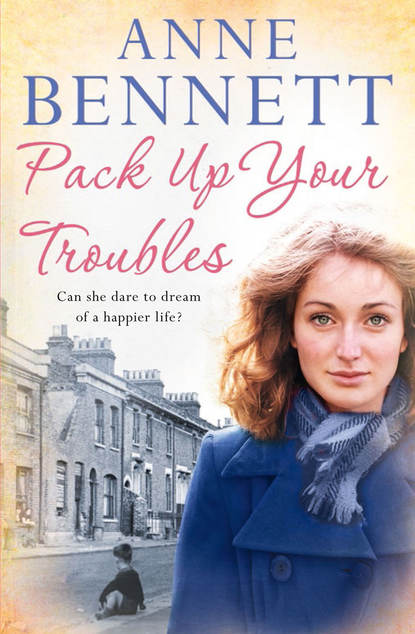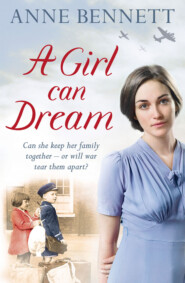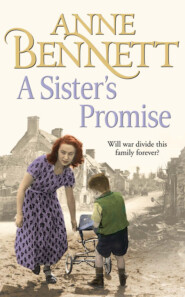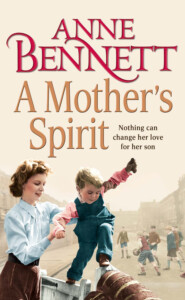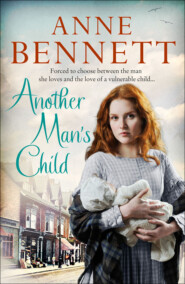По всем вопросам обращайтесь на: info@litportal.ru
(©) 2003-2024.
✖
Pack Up Your Troubles
Автор
Год написания книги
2018
Настройки чтения
Размер шрифта
Высота строк
Поля
Home! Just to say the word lifted her spirits, and she pushed her small son through the door, laughing gently at his disgruntled face.
There was no one about but Elsie to bid the family farewell. It was that hour in the morning when few women would be around; those husbands still in work would have left and the women would be busy organising their families for the day, and Maeve was glad of it.
She and Elsie clung to one another, though they weren’t in the habit of it, and when they drew apart there were tears in both women’s eyes.
‘Write to me?’ Elsie urged, and as Maeve nodded she asked, ‘You have let your family know you’re coming?’
‘Aye,’ Maeve said, but she didn’t say she’d left sending the letter till the day before. It would arrive that morning and it would be too late for her mother to tell her not to come. She didn’t expect a rapturous welcome in the farmhouse in Donegal, for her mother would never countenance a woman leaving her husband. She’d said a novena to the Blessed Virgin that she’d be able to convince her mother that she had a justifiable cause for walking out on Brendan Hogan. Anyway, that was it! She’d burnt her boats now right enough.
She straightened her shoulders, hoisted up her case, bid Elsie goodbye and walked down the street with a child each side of her.
FIVE (#ulink_3f4e828e-558b-55fa-9963-3ff981be6073)
The children loved the train, as Maeve knew they would, and they ate their jam sandwiches, washed down with the pop from the cracked cups, almost as soon as they were settled. They were enchanted by the countryside they passed through. Now and again cows stared nervously at them over farm gates and sheep on the hillsides tugged on the grass relentlessly. Maeve told them the names of the animals and of the crops growing that they’d never seen before.
By the time the train reached Liverpool, both children were beginning to tire, but the excitement of going on a ship buoyed them up and the sight of it didn’t disappoint them. ‘Ulster Prince,’ Kevin said, reading out the name on the side. ‘Isn’t this grand?’ And it was grand, though the day had got duller as they travelled north, and rain began to fall as they went on to the gangplank. Maeve hoped it would stop raining soon so that the children could explore the ship without getting soaked. She peered over the rail and looked at the water lapping backwards and forwards as the vessel shifted slightly. It looked grey and scummy, not unlike the water that was left in the copper in the brew house after she’d done the washing.
The ship’s hooter sounded, making the children jump, and Kevin watched the frenzied activities on the dockside. ‘They’re pulling up the gangplank,’ he cried, ‘and loosening those thick ropes.’
Maeve lifted Grace to look over the rail and the three of them watched the ferry pull away from the shores of England and from Brendan Hogan with relief.
The ferry had gone no distance at all and Liverpool was still a blur on the horizon when Grace began to feel sick. Kevin left his nauseous sister, tended by his mother, who was, he decided, a most peculiar colour herself, and went off to explore the ship.
He was back in just a few minutes. ‘Mammy, there’s a café here,’ he cried, ‘like a proper one with pink curtains at the windows and they’re selling breakfast. Porridge, toast and jam and a pot of tea for one and six.’ He’d watched some of the people eating and his mouth had watered.
Maeve badly wanted to dip into the store of money and give him one and six. It was cheap enough, for Grace was in no state to eat and she herself was trying to ignore the churning of her stomach to deal with her daughter. But, she didn’t know how long the money would have to last them.
Regretfully Maeve shook her head. ‘I have to watch the pennies.’ Kevin didn’t argue – hadn’t it been the same all the days of his life? – but Maeve saw the disappointment in his eyes. She knew he was hungry. They’d not had much to eat on the train and to make it up to him she gave him a few sandwiches, a couple of cold sausages and a slice of cake. After it, Kevin ran around every bit of the ship that he was allowed in, along with other young boys as eager as he was to see all there was to see.
Maeve and Grace didn’t share Kevin’s enthusiasm and were glad to get off the heaving rolling ship and on to dry land once more, where Maeve shared out the rest of the food. Grace was very tired from all the travelling and once she’d eaten a little, she laid her head on her mother’s knee and went fast asleep. Even Kevin allowed his eyelids to droop. He was becoming calmer the further they went from the house, and even Maeve was more relaxed.
‘Lean against me, Kevin, if you’re tired,’ she said.
‘Aren’t you tired too?’ Kevin asked her.
‘No,’ said Maeve. ‘I’m too excited to sleep.’
She was apprehensive too, though she didn’t share that with Kevin, but whatever reception she found at her journey’s end, she knew it would be better than the life she’d left behind. Kevin was reassured and allowed himself to sleep, and so deep was his sleep that Maeve had to shake him awake when they got to Portadown.
The conductor on the rail bus they boarded for the last leg of their journey recognised Maeve. ‘Well, hello there, Maeve Brannigan.’
‘Hogan now,’ Maeve corrected him.
‘And these are your two?’ he said, smiling at the children. ‘Home for a wee holiday, are you all?’
‘We are that,’ Maeve said firmly, before either child was able to say anything else. ‘And glad of it.’
‘And I would be if I lived in Birmingham,’ the conductor said, and added to Maeve, ‘I bet your mammy will be pleased to see you. It’s strange that she didn’t mention you coming.’
‘It was a spur-of-the-moment thing,’ Maeve explained, and hoped her mammy would indeed be pleased.
In the dim evening light she could just see the green Donegal hills flecked with sheep, and dotted here and there with little thatched cottages that had plumes of smoke rising in the air. She closed her eyes in relief and happiness. She was nearly home. She pointed out the familiar things to the children and they listened eagerly as she described her parents’ farm to them as the rail bus ate up the miles.
‘Here we are, then,’ the conductor said suddenly.
Grace and Kevin looked about them as they alighted. ‘We can’t be here,’ Kevin said, ‘because it isn’t anywhere.’
Maeve didn’t answer him straight away and instead pulled their luggage from the rail bus to lie at a heap at their feet. She’d helped the children on with their haversacks and picked up the case before she said, ‘This isn’t a proper station like those we passed; really it’s not a stop at all, just the place nearest to the farm. We go through the gate and we’re nearly there,’ and so saying she opened the five-barred gate.
Maeve saw the children looking about them, and led them up the path that ran between two hedges bordering fields on either side. Dusk had fallen and suddenly Maeve felt the children’s hands tighten in her own.
‘Why isn’t anyone here to meet us?’ Grace asked, and Maeve could see Kevin’s puzzled eyes on her too.
Maeve also wondered that. What if they wouldn’t even see her? She told herself firmly to stop frightening the life out of herself and said as confidently as she could, ‘I expect they’re all busy, and anyway, it’s only a step away now.’ And then she laughed at the children’s fright when two cows put their heads over the hedge and lowed at them.
They came to the corner of the cottage and as they turned into the cobbled yard in front of it there was a sudden terrific noise from a building beside the barn, but Maeve told her bemused children it was just the hens locked up for the night disturbed by their footsteps on the cobbles. The words had barely left her mouth when the farmhouse door suddenly opened and two dogs leapt out of it and around them, snapping and barking. Grace screamed and held tightly to her mother.
‘Skip, Laddie,’ said a stern voice from the doorway, and Maeve turned to look at the young man framed in the doorway.
‘Colin?’ she said in wonder and surprise. ‘Little Colin?’
‘Not so little now,’ Colin replied. ‘I’m sixteen.’
She’d known he was sixteen, for hadn’t her mother written with news of the family? But in her mind Colin was still the wee boy of seven she’d left behind nine years before.
‘You’d better come in,’ Colin said.
Later the children told Maeve how pretty they thought the house was. It was low and painted white, with little windows all along the side of it and thatched with yellow straw, and grey smoke escaped from the squat chimney. The door was in two halves so you could open the top or the bottom. Both now stood open and Maeve led the children inside.
She had her heart in her mouth as she entered the dim farmhouse. It was just as if she’d never left. There was the press opposite the door containing all the crockery and a food cupboard to the side of it. Two pails of water stood on stools by the side of the bedroom door, while to the other side was the huge kitchen table before one of the windows with wooden chairs arranged around it. The settle and the armchairs were pulled up before the peat fire, and the curtained-off bed that belonged to Maeve’s parents was in the far corner.
The only difference was in the group waiting for her. There was no Tom, for he’d been married two years before, and no Liam, away in Dublin, and Kate too was living there, in the nurses’ home. Rosemarie was there, but Maeve knew she was engaged to be married, yet she’d been just twelve when Maeve had left home. Colin was still at home, and Nuala, no longer the wee child of just four striking out for independence, but almost a young lady of thirteen.
Her parents hadn’t changed. There might have been a few more grey hairs in her mother’s head, and more lines on her face and on that of her father, but they’d altered so little compared to the children. And across the room, in the silence that screamed around her, she saw them all staring at her.
Annie Brannigan waited for her daughter to speak, to explain to them why she’d done the disgraceful thing of leaving her husband and coming back home with her children.
Grace and Kevin were weary despite the snatches of sleep they’d had, and both were bone tired of getting on and off trams, trains, ships and rail buses. And now they were here in their mammy’s old home and no one seemed to welcome them at all. Maeve saw the wobbling chin of her daughter and the obstinate scowl of her son, and she licked her lips nervously and said in a voice little more than a whisper, ‘Hello, Mammy, Daddy.’
‘Hello! Is that all you can say after nine years and you descending on us like this, and the only notice a scribe of a letter that arrived this morning telling us so?’ Annie asked her daughter angrily.
‘I’m sorry,’ Maeve said. ‘I had to come. There were reasons.’
She saw Grace’s face pucker and the tears that had been threatening since she’d entered the farmhouse spilt down her cheeks. She sank to the flagged kitchen floor with a loud sob, crying, ‘I don’t like it here.’
The sight of the child crying smote Annie’s heart. Whatever was wrong it wasn’t the children’s fault, and she went forward and gathered Grace into her arms. ‘And you’re Kevin, I suppose?’ she said to the boy, who was scowling at her, and without waiting for him to answer went on, ‘Take that look off your face, boy, and come away to the fire. If I know weans, a little food won’t come amiss and will put a new complexion on the matter altogether.’
After that, it wasn’t so bad at all. No one spoke of their unexpected arrival in front of the children. Instead Annie began to prepare a meal for them while Rosemarie and Nuala laid the table and Colin carried the cases and haversacks into the bedrooms.





